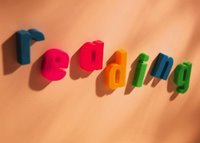 Faced with faltering reading skills among students, educators take action
Faced with faltering reading skills among students, educators take actionIn an increasingly complicated world, technology-driven and rich and information, reading is more important than ever, writes journalist Carol Guensburg. At the same time, books seem to be taking a back seat to computers and other digital devices. Studies show that more than 8 million students in grades 4-12 struggle to proficiently read, write and comprehend. Only three out often eighth graders read at or above grade level, according to the 2004 National Assessment of Educational Progress. Readers who fall significantly behind risk school and workplace failure.
In 2003, only three-fourths of high school students graduated in four years, the National Center for Education Statistics reports. During the previous year, just over half of African American and Hispanic students graduated at all.
So how should educators address these challenges? Guensburg offers some insight in her article for Edutopia.
Via: Public Education Network
Tags: Literacy, Reading, Language, English, Education, K-12, ELL, ESL, ESOL, Culture, Education by Sistrunk
8 comments:
happy valentine's day!
Letter Shredder: Happy Valentine's Day to you, too!
Belated Happy Hearts Day to you, DCS!
Hope you had great Valentine's day!
Reading is SO very important. You cannot do anything great in life without it. Last I heard, Baltimore (the closest big city to me) has one of the worse literacy rates in the country. It is directly correlated with poverty. I know that doesn't prove causation - but it cannot be ignored.
Cecilia and Brea: Thank you. I hope both of you had fun on Valentine's Day.
Brea, you're right about Baltimore. But it's not alone. Sadly, many urban school districts report dismal literacy rates. For more information on literacy rates and the impact of poverty, you might want to check out the National Center for Family Literacy and The Education Trust.
Schools that provide the proper resources to students - and use effective research-based models in the classroom - can make substantial gains in improving student performance.
And let's not forget the impact of parents, who are their children's first teachers. Parent-child literacy activities in the
home, such as helping children
recognize letters, reading to children, or assisting children with reading and writing assignments, have been found
to improve children’s language skills and heighten their interest in books.
Literacy is an important education issue worldwide. Look for future posts on this topic.
This is a topic I am keenly interested and will follow. Why? We need literacy here more than anyone else in the world. Thanks for bringing it up.
I agree that literacy is the most important subject. I am a first grade teacher and mother of a 13 year old boy. Since he began Middle School, reading a book in no longer an interest. He will use his computer as the information all source. Of course there is the text book reading but overall I have seen a huge decrease in the casual enjoyment of reading a novel. I am interested in learning more about the studies of literacy and what is reason for the decrease interest in reading?
Maryann
Maryann: Ah, the middle school years. Your comment reminds me of what I experienced with my daughter when she was in middle school. At first, I thought she lost interest in reading, too, although her grades remained good. I learned that my daughter still enjoyed casual reading. She just started reading different material, such as literature from the urban genre. Fortunately, she picked books that represented the best of urban lit, not some of the trash that is poorly written but sells well.
My daughter, who is in high school now, uses the Internet frequently as a source of information, but she still goes to the library.
I wouldn't worry about your son yet. I'm sure you've established a great foundation in him when it comes to reading.
You have brought up some great points about middle school literacy. You've got me interested in this! :-)
Whenever I find any information of interest, I will be happy to share it. If you find something first, I hope you'll share.
Since you're a first grade teacher, you can be our resident expert when it comes to literacy in the primary grades. I'm depending on you to keep us posted on new developments or best practices. :-)
Post a Comment